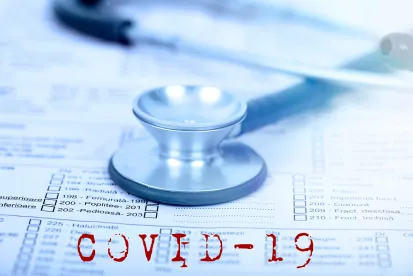On July 15, 2020, Virginia became the first state in the nation to promulgate an Emergency Temporary Standard to address COVID-19 in workplaces. Even with vaccine deliveries on the way, Virginia has proposed a Permanent Standard for consideration by the Virginia Safety and Health Codes Board (which includes author Courtney Malveaux).
The Emergency Temporary Standard
Since July 27, 2020, Virginia Occupational Safety and Health (VOSH), the state counterpart of the Occupational Safety and Health Administration (OSHA), has enforced an Emergency Temporary Standard that mandates — and, in some instances, exceeds — guidance issued by the U.S. Centers for Disease Control and Prevention (CDC) and OSHA. The Emergency Temporary Standard covers most private employers in Virginia, as well as all state and local employees.
Virginia is a “State Plan” state that operates its own occupational safety and health program under an OSHA grant. There are 27 other “State Plan” states that are enabled to promulgate similar COVID-19 standards. Michigan, Oregon, and California have already done so.
In addition to CDC and OSHA guidelines, the Emergency Temporary Standard includes provisions that require employers to:
- Provide flexible sick leave policies, telework, and staggered shifts when feasible;
- Provide both handwashing stations and hand sanitizer when feasible;
- Assess risk levels of employers and suppliers before entry;
- Notify the Virginia Department of Health of positive COVID-19 tests;
- Notify VOSH of three or more positive COVID-19 tests within a two-week period;
- Assess hazard levels of all job tasks;
- Provide COVID-19 training of all employees within 30 days (except for low-hazard places of employment);
- Prepare infectious disease preparedness and response plans within 60 days;
- Post or present agency-prepared COVID-19 information to all employees; and
- Maintain air handling systems in accordance with manufacturers’ instructions and American National Standards Institute (ANSI) and American Society of Heating, Refrigerating and Air-Conditioning Engineers (ASHRAE) standards.
The Emergency Temporary Standard protects employees who raise reasonable concerns about infection control to print, online, social, or other media. It also requires building and facility owners to report positive COVID-19 tests to employer-tenants. The Emergency Temporary Standard also implements provisions that echo CDC and OSHA guidance, including requirements to:
- Place requirements on workplaces based on hazard levels (i.e., “very high,” “high,” “medium,” and “low”);
- Screen employees prior to entry to work;
- Establish requirements for employees with COVID-19 positive tests and symptoms before returning to work;
- Require social distancing or, when social distancing is not possible, respiratory protection; and
- Clean and disinfect commonly used areas and equipment.
The Emergency Temporary Standard is set to expire January 26, 2021. A business organization and several employers have challenged the Emergency Temporary Standard in a lawsuit pending in the Circuit Court for the City of Richmond, Virginia.
The Proposed Permanent Standard
VOSH has since published a Proposed Permanent Standard for consideration by the Safety and Health Codes Board when the body meets on January 12, 2021. The Proposed Permanent Standard could have encompassed infectious diseases generally, but the agency instead surprised some observers by limiting the scope of the permanent standard to COVID-19.
VOSH published the Proposed Permanent Standard as COVID-19 vaccines have begun to become available. It is not yet clear whether the availability of vaccines will make the pandemic a temporary concern, which raises the question as to the need for a permanent standard in lieu of another temporary standard of six months’ duration that is coextensive with Virginia Governor Ralph Northam’s current State of Emergency. VOSH addressed the question in part by directing the Board to consider the necessity of the standard if Governor Northam lifts the State of Emergency.
The Proposed Permanent Standard includes the provisions in the Emergency Temporary Standard, with several notable changes:
- Requirements unrelated to occupational safety and health, such as contingency planning for business operations in the event of an outbreak, have been removed.
- No enforcement actions will be brought against healthcare providers and other employers that are making good faith efforts to secure Personal Protective Equipment (PPE) that is in short supply.
- It cannot be used to enforce Governor Northam’s Executive Orders. This takes on particular significance in light of Governor Northam’s most recent Order expanding face covering requirements, particularly in indoor settings. It is unclear whether the Order applies to low-hazard workplaces with physically distanced employees.
- It scales back the requirement to report every positive COVID-19 case to the Virginia Department of Health to “outbreaks” of two or more cases.
- It makes the time-based, return-to-work requirement consistent with CDC guidance that reduced the requirement from 10 days with three symptom-free days to 10 days with only one symptom-free day.
- It removes the requirement for employers to comply with respiratory standards when multiple employees travel in work vehicles together, in light of shortages of N-95 and other filtering facepiece respirators.
The Proposed Permanent Standard contains several problematic aspects of the Emergency Temporary Standard. First, it includes no prohibition on barring employees from coming to work after close contact with an individual who has tested positive for COVID-19. Second, several of its provisions relating to return-to-work and close contact do not allow employers to benefit from continually evolving CDC guidance. Third, it includes whistleblower protections for employees who report concerns to the news media or social media, which may invalidate some employers’ media policies. Finally, the Proposed Permanent Standard lacks “safe harbor” protections for employers that protect employees by following CDC guidance.
Stakeholders may provide their comments to the Safety and Health Codes Board on the Proposed Permanent Standard online through January 9, 2021, and they also may participate in a public hearing on the matter on January 5, 2021. Details on participating in the public hearing should be published soon on the Safety and Health Codes Board’s website.



 />i
/>i

